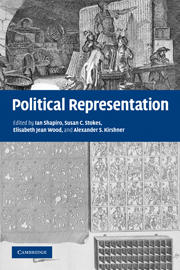Book contents
- Frontmatter
- Contents
- List of figures
- List of tables
- List of contributors
- Preface
- Editors' introduction
- Part I Representation before representative democracy
- Part II Theories of political representation
- 3 Varieties of public representation
- 4 Representative government and popular sovereignty
- 5 Making interest: on representation and democratic legitimacy
- Part III Representation and inherited injustice
- Part IV What role for representative quotas?
- Part V Preferences, persuasion, and democratic representation
- Index
- References
4 - Representative government and popular sovereignty
Published online by Cambridge University Press: 05 June 2012
- Frontmatter
- Contents
- List of figures
- List of tables
- List of contributors
- Preface
- Editors' introduction
- Part I Representation before representative democracy
- Part II Theories of political representation
- 3 Varieties of public representation
- 4 Representative government and popular sovereignty
- 5 Making interest: on representation and democratic legitimacy
- Part III Representation and inherited injustice
- Part IV What role for representative quotas?
- Part V Preferences, persuasion, and democratic representation
- Index
- References
Summary
Are representative governments working well? The answer to that question depends on what we think the purpose of representative government is. Most research in political science presumes that the purpose of representative government is to represent the will of the people by translating popular sentiment or public interest into governmental policy. It therefore presumes that a good measure of the performance of representative democracy, at least in its representative capacity, involves comparing policy results with public opinion as it is or as it should be. The classic study of constituency influence in the House of Representatives by Miller and Stokes, for example, focused on “the extent of policy agreement between legislator and district” (Miller and Stokes 1963). More recent work continues to investigate similar relations: Page and Shapiro look for “congruence between changes in policy and changes in opinion” and assume that “normative concepts of democracy” would mandate something close to “direct democracy” (Page and Shapiro 1983). Stimson, Mackuen, and Erikson ask “whether the national system is efficient in turning popular sentiment into policy” (Stimson et al. 1995). These studies, and many more like them, presume a principle close to the one that Bartels articulates clearly: “The appeal of representative democracy hinges on the responsiveness of elected politicians to the preferences and interests of their constituents” (Bartels 1991).
- Type
- Chapter
- Information
- Political Representation , pp. 90 - 110Publisher: Cambridge University PressPrint publication year: 2010
References
- 16
- Cited by



